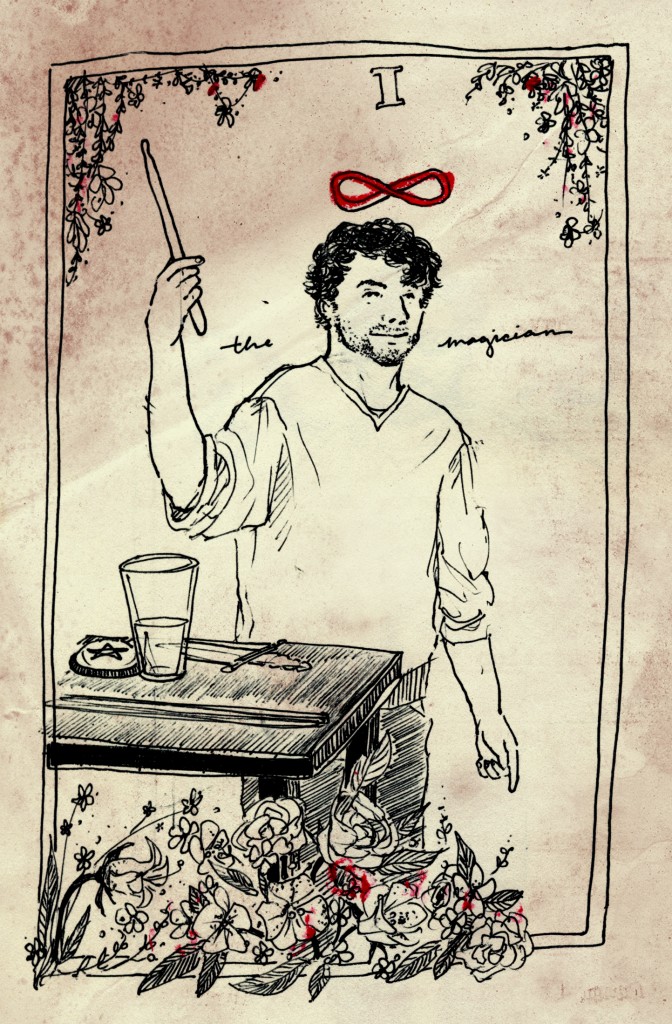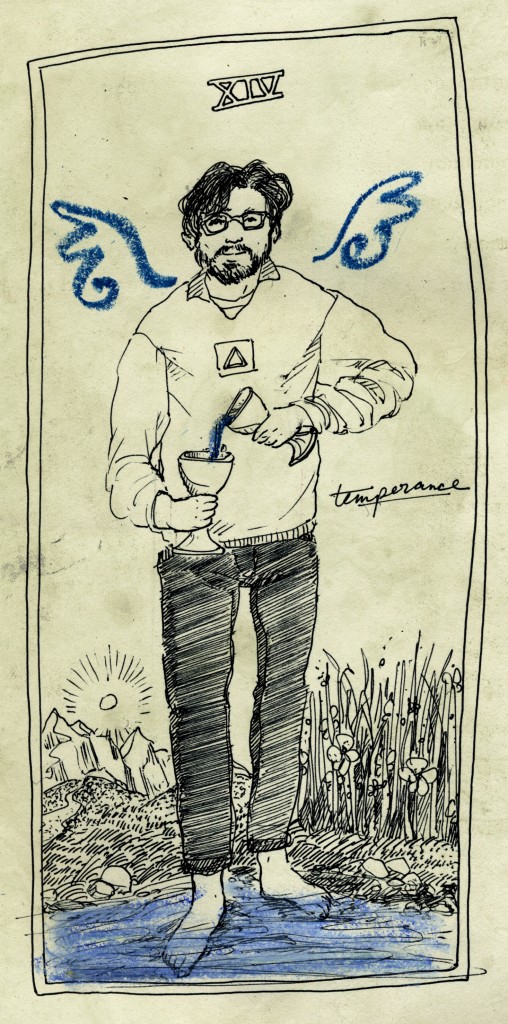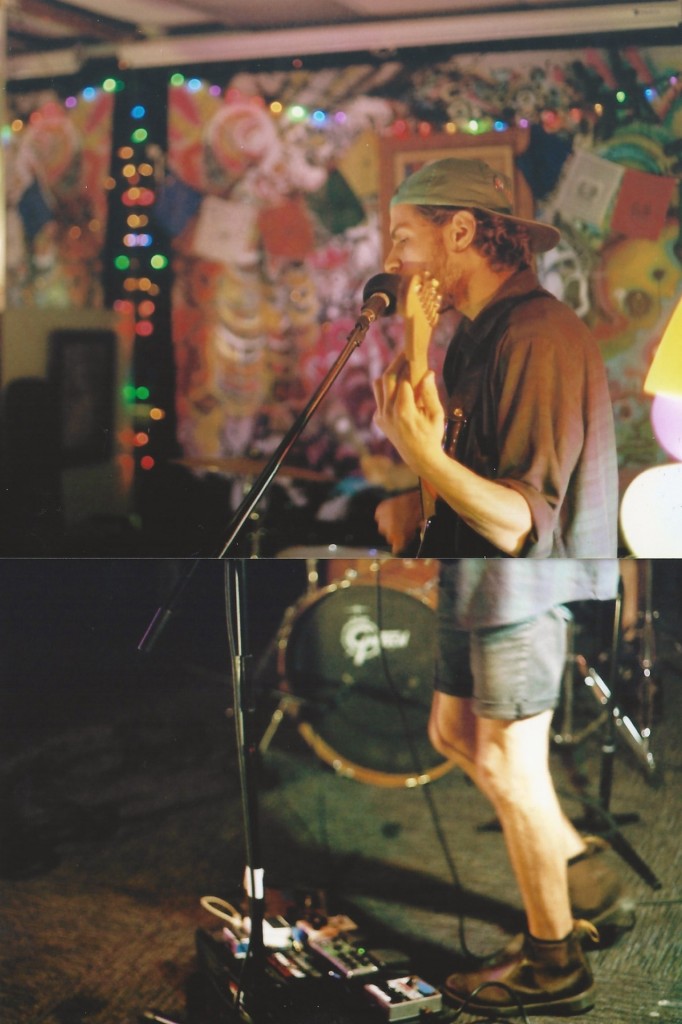
With the bare bones of Horse Jumper formed, Dimitri took on the role of introducing Jamie and John to the Jamaica Plain scene.
“I had seen kinda emo-y, pop punk, and hardcore stuff at the Democracy Center, but it was very different from Whitehaus,” John explained. A decade-long staple of the Jamaica Plain house show scene, Whitehaus provided a home to the ever-changing pulse of Boston’s DIY scene and served as a space of aspiration for Giannopoulos. “I first started going to shows at Whitehaus when I was 17 because I lived real close,” Dimitri explained. “I remember when I was still in high school, it was super folk-oriented and very Chris Weisman-like. There’d rarely be a rock band like there is now.”
As Dimitri started appearing at more shows, he eventually befriended fellow show-goer Jasmine Taibi, who would later start the booking collective Show Mom. “I met Dimitri in high school. I think we talked a couple times about liking Radiohead and Animal Collective and not liking Latin class,” Taibi recalled.
Taibi eventually would be the one to book Horse Jumper of Love’s first Whitehaus show, which was Giannopoulos’s creative high water mark at the time. “When Jasmine booked our first show there, it was literally like, ‘oh my god, I’m playing at the Whitehaus in JP!’ That scene directly influenced me, [specifically] people like Avi Jacob and ACLU Benefit.”
“What separates [Horse Jumper] from other bands that I book is their personalities,” says Taibi. “I’ve watched them become a ‘band to watch’ and I know they work incredibly hard at being conscious musicians. They are a thoughtful bunch of guys who don’t want to take up too much space.”
Horse Jumper spent the next couple years expanding from occasional Whitehaus shows to near-constant inclusion on bills across the city, building a steady stream of praise from scene influencers and potential labels.
“I first saw them after a tour during the summer of 2014,” GAWK Records founder and Vundabar frontman Brandon Hagen recalls. “I was feeling that weird ‘post-tour floating’ feeling, so I floated down into a basement and remember being blown away by them. I’d never heard of them before and was instantly won over.”
“It was also the first night that my roommate, Bradford Krieger [of Magic Magic] and I had seen them,” Dustin Watson of tape label Disposable America, adds. “He never stopped talking about Horse Jumper again after that. Bradford’s unceasing fanfare over the band from day one really sealed the deal and he brought the band and I together.”
Although their live shows have been a testing ground for new song ideas over the years, the songs that would eventually comprise their full-length, which was recorded with Krieger throughout 2015, were more or less decided by that first Whitehaus show. “Those songs on the album, those are the songs I wanted to be on our first album for three or four years now,” Dimitri estimates.
As such, Horse Jumper of Love feels like a bridge between adolescence and the ever-hazy concept of a “stable adulthood.” Its eight brief tracks sway between the woozy distortion that dominates their live shows (lead single “Ugly Brunette”, “Spaceman”, “DIRT”) and the lo-fi ambience Giannopoulos crafted on the band’s first few EPs and in his solo work as The Meat Tree (“July 5th”, “I Want To Paint Horses…”) If anything unifies the record though, Giannopoulos’s storytelling remains an urgent but oblique force, even down to the album’s scrawled-out story of a cover.
“I feel like Dimitri picks out these really specific side details in what is otherwise a progressing narrative,” Doran observes. “There are these really specific terms and phrases he uses that can be put into a larger narrative, like they’re little occurrences in and of themselves.” Even when John picks out themes like “detachment, love, the lack thereof, and an American childhood” as the album’s focal points, Dimitri divides those themes further to specific objects like spilled yogurt on a plant with a sense of self-effacing humor.
“One day I was eating yogurt outside, I missed my mouth, and a huge glob of it fell on a leaf,” he recalls when talking about non-album track “Volcano”. “I feel like I watched it in slow motion. I said to myself, ‘this never happens.’ Then I realized I freaked myself out over some yogurt on a plant.” Laughing a bit at his own expense typically evades his soft-spoken live banter, but when he dredges his “American childhood” from the memory of a bleached shirt on “Ugly Brunette”, it comes up unabashedly sincere.
“I grew up in a very Greek family. I definitely wanted to be super American when I was little though,” he reflects. “There was inner turmoil of being embarrassed of my mom speaking Greek to me in front of my friends sometimes.” Despite their differing definitions of an American upbringing, Giannopoulis, Margaris, and Doran have built an undeniable system of support around each other, which the trio jokingly acknowledged as an endearing form of co-dependence.
 “I can’t do anything live without John or Jamie now,” Dimitri admits. “Like, every time I’m supposed to play a solo set, I tell John he has to play keyboard or something.” He goes on to add that even their rawest ideas, whether they’re written for Horse Jumper, John’s band Community College, or Jamie’s occasional acoustic songs, only leave their tight circle with each other’s stamp of approval.
“I can’t do anything live without John or Jamie now,” Dimitri admits. “Like, every time I’m supposed to play a solo set, I tell John he has to play keyboard or something.” He goes on to add that even their rawest ideas, whether they’re written for Horse Jumper, John’s band Community College, or Jamie’s occasional acoustic songs, only leave their tight circle with each other’s stamp of approval.
“I remember once at John’s brother’s house, they had this small party where the point of it was for people to play songs,” Jamie recalls. “I loved being able to sit there and see the bare bones of what Dimitri and John do. First of all, [Dimitri] is a really fucking good guitar player. Sonically, I feel, he thinks on a grand scale, but hears things on a certain scale. With John, it feels different. You end up feeling different because his songs are, like, succinct poems that punch at you. I feel like you feel directly what he was feeling at the time.”
Those intrinsically “different” but equally intimate ways of emoting appear to be what have guided Horse Jumper to where they are now, not only on the cusp of co-releasing their LP with the Vundabar-led Gawk Records and Disposable America, but as each other’s confidants and sources of inspiration.
Their album ends on the fittingly titled “I love you very much forever”, a warped lullaby that slows down one of their earliest demos, the Late Greats-esque “Heathen”, to barely legible speeds.
“I got bored after three minutes and 12 seconds of listening to it slowed down as much as possible on my Tascam, so I just stopped it where I started getting bored,” Dimitri admits with a laugh. “I just didn’t know how else to end it.” As a result, “love” dramatically ends just as it’s starting to build, which Giannopoulis says you can prescribe whatever deeper meaning you want to. It feels very much like a move the existentially doubting, teenage Dimitri would relish in, but the Dimitri I talk with now feels far more secure in the world he’s built around him.

Photo by Joe Evers
“Who isn’t freaked out by life as a teenager? I needed a way to cope with that, so I wrote these songs about being weirded out by things,” Dimitri reiterates. “Sometimes, everything gets very loud and overwhelming,” John continues, “and I don’t wanna say anything too corny, but I love when Dimitri sings to me. I love the way Dimitri makes me feel and I want you to feel the way I feel.”
Such a request feels easy with the honesty that swirls around Horse Jumper of Love’s self-made reality.
Whether it’s in the privacy of Dimitri’s living room, at venues Jamie is on the cusp of being able to get into, or wherever their tape-bound confessionals end up, the effervescent feeling of three twenty-somethings finding safety in each other lingers so heavily, even a sentiment as big as “I love you very much forever” somehow feels cut to the exact right size.
Horse Jumper of Love will be available in digital and tape formats on 3/11. Preorders are available via GAWK/Disposable America. Catch HJOL on tour now with Soft Fangs.
